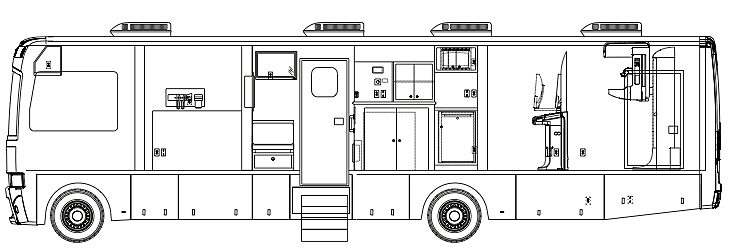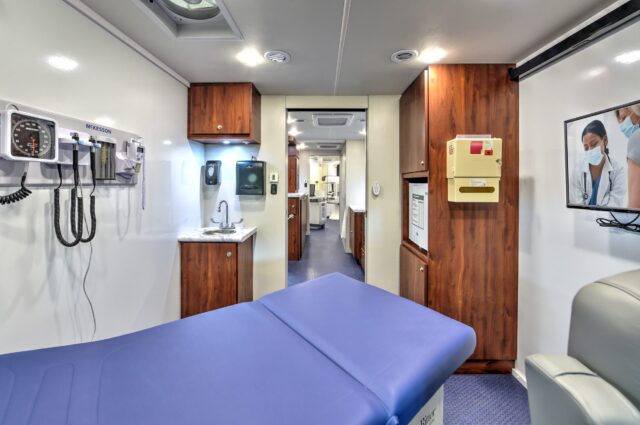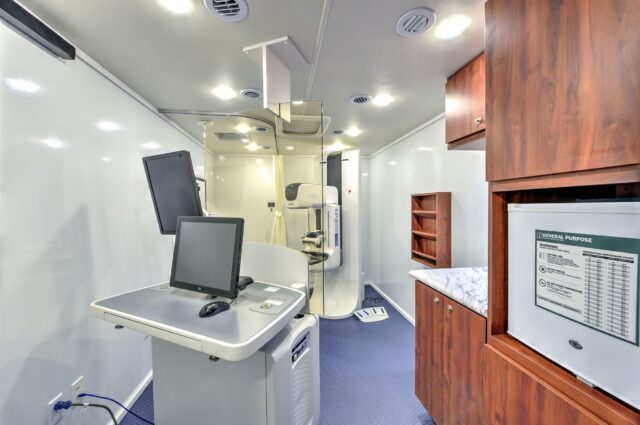UF Health Cancer Center to launch mobile mammography unit and expand access to care

Renderings of the mobile unit. Courtesy of Tesco.
For many individuals living in the rural 23-county area of North Central Florida served by the UF Health Cancer Center, access to mammography services for breast cancer screening is limited.
But now, with a $1.5-million grant awarded through University of Florida President Ben Sasse’s strategic funding initiative, the UF Health Cancer Center will launch an initiative called Expanding Access to Breast Cancer Screening in North Central Florida. A mobile mammography unit will be outfitted with leading-edge technology to bring services directly to the community. The unit will be the first of its kind in North Central Florida – a region larger than Massachusetts, Rhode Island, and Connecticut combined.
“As a National Cancer Institute-designated cancer center, the UF Health Cancer Center is charged with addressing the burden of cancer in the large area we serve, with a strong focus on rural and aging populations,” said Jonathan D. Licht, M.D., director of the UF Health Cancer Center. “This innovative mobile unit will enhance our evidence-based outreach efforts in unprecedented ways. Our goal is to reduce the burden of late-stage cancer diagnoses and mortality through early detection and personalized services that help people access the treatment they need.”
Breast cancer is among the most prevalent cancers in North Central Florida, with rural communities having higher rates of advanced stages of the disease (cancers that are the hardest to treat), as well as higher mortality. These rural communities also have high poverty rates, which often lead to significant barriers for those trying to access preventive health care.
Mobile mammography units are powerful tools that help detect cancer in its early stages so that treatment can begin as quickly as possible (before the disease spreads). These units are cost-effective, reducing the need for physical infrastructure and easing the burden on health systems. And studies have shown that mobile mammography units are effective for reaching underserved communities.
The mobile unit will also be equipped to provide screening for other diseases, including cervical and colorectal cancers. To increase the unit’s impact and ensure continuity of care, highly trained community health workers will help patients access primary care services and connect with UF research studies. The team also will help uninsured community members apply for vouchers from the Florida Department of Health to cover mammography costs.
“By bundling cancer screening services, we will leverage the mobile unit to reach more people, encouraging community members to opt for multiple screenings closer to where they live (and to bring their friends and family to get screened, too),” said Ramzi Salloum, Ph.D., the associate director for community outreach and engagement at the UF Health Cancer Center. “The deployment of a mobile unit to enhance access to risk-reduction education and preventive services in our neighboring communities, as well as to foster a meaningful relationship with rural community providers, will allow UF Health to provide high-quality care beyond our walls (where it is needed most).”
The UF Health Cancer Center has been hosting mobile mammography clinics with its community partners (using rented units) for the past year, but the need is outpacing the units’ availability, Salloum said. There is a pressing need for a dedicated unit due to the significant disparities in this region, such as lower screening rates compared with the rest of the state of Florida. Late-stage diagnosis rates for Black women living in the area are also higher than both state and national rates.
To meet this need for care quickly, the mobile unit is expected to begin operating this fall. Along with a matching investment from the UF Health Cancer Center, funds from Sasse’s strategic initiative will support the unit’s development, its 3D mammography equipment and screening supplies.
“The University of Florida can eliminate barriers to cancer screenings, and this initiative will help us get there,” Sasse said. “The project will be instrumental in bringing breast cancer awareness and improved health to underserved communities.”
About the author


